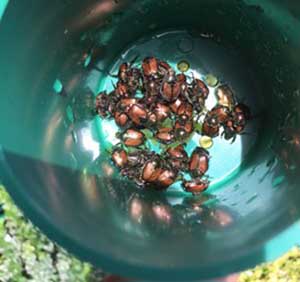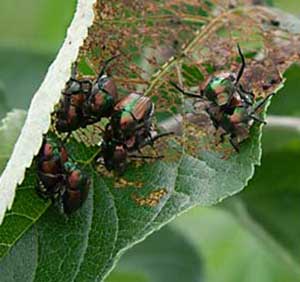
The Washington State Department of Agriculture caught hundreds of Japanese beetles on the first day of checking the recently placed beetle traps, according to a news release.
WSDA collected 415 Japanese beetles in several traps when trappers began checking them June 29. The beetles were primarily collected near public schools in Grandview. The traps have been placed in Yakima County near areas where WSDA trapped just three beetles last year and where a Grandview resident reported finding dozens of the pests on her roses last summer.
“Given the damage these beetles can do, finding so many beetles so quickly is definitely concerning,” said Greg Haubrich, WSDA pest program manager. “It further illustrates how important this year will be for determining how large of an infestation we have in Washington. While our traps will provide critical data, residents reporting Japanese beetle sightings continues to be incredibly important.”
Adult Japanese beetles are metallic green and brown and have little tufts of white hairs on their sides. They emerge — usually from lawns or other soil — and feed throughout the summer. From fall to spring, the grubs overwinter in the soil and slowly develop into mature adults ready to emerge again in the spring. While roses are a favorite, Japanese beetles feed on more than 300 types of plants, including crops widely grown in the Yakima Valley, such as grapes, hops, apples, cherries, corn, peaches and asparagus.
If these beetles become established in Washington, it will have serious impacts on gardens, parks, lawns and agriculture, according to the release.
WSDA is asking anyone who thinks they see Japanese beetles to collect them, take a photo and submit a report at: agr.wa.gov/beetles. Japanese beetles do not bite or sting, so they can be safely and easily collected.
Residents can protect their own yards and gardens and help determine the pest’s spread by also trapping the beetles. Traps are available at local farm and garden centers or can be purchased online. All residential trap catches should also be reported to the state.
—by Jonelle Mejica







Leave A Comment